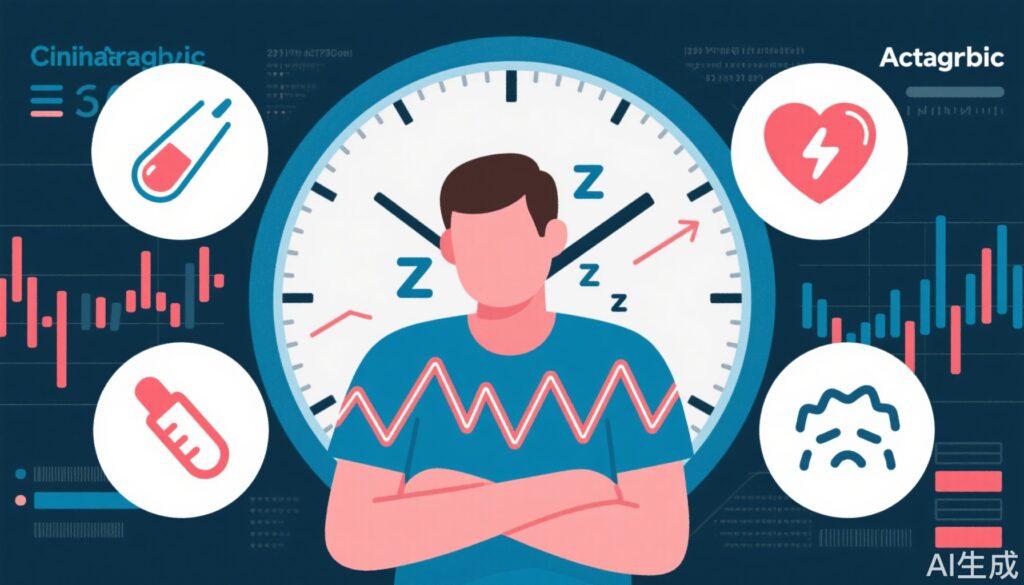Highlights
– Irregular sleep duration increases the risk of type 2 diabetes by 34% compared to regular sleepers.
– Variability in sleep patterns is associated with elevated cardiometabolic risk, especially in diabetes and hypertension.
– Day-to-day sleep duration fluctuations predict higher all-cause mortality.
– Excessive weekend catch-up sleep correlates with increased depression risk.
Study Background and Disease Burden
Sleep health is increasingly recognized as a critical component of overall well-being, extending beyond duration to encompass regularity in timing and quantity. Recent epidemiological and biomarker-based studies reveal that irregular sleep patterns—characterized by variable bedtimes, wake times, and sleep duration—are prevalent in modern society. Such variability is implicated in the rising burden of non-communicable diseases, including type 2 diabetes, cardiovascular disease, and depression. With global diabetes prevalence exceeding 10% and depressive disorders remaining a leading cause of disability, clarifying the impact of sleep regularity on these outcomes holds significant clinical and public health relevance.
Study Design
Multiple high-quality studies have addressed the link between sleep regularity and health outcomes:
– The UK Biobank prospective cohort (Kianersi et al., Diabetes Care, 2024) analyzed accelerometer data from over 84,000 participants (mean age: 62, diabetes-free at baseline), tracking sleep duration variability and incident type 2 diabetes over 7.5 years.
– A narrative review (Zhang & Qin, Front Cardiovasc Med, 2023) synthesized clinical evidence on sleep regularity metrics—standard deviation (SD) of sleep duration/timing, sleep regularity index (SRI), interdaily stability (IS), and social jetlag (SJL)—and their associations with cardiometabolic risk.
– The MIDUS 2 Biomarker study (Katamreddy et al., J Clin Sleep Med, 2022) followed 388 adults for 8.6 years, collecting actigraphy data to assess day-to-day sleep variation and subsequent mortality risk.
– NHANES 2021-2023 data (Sun et al., BMC Psychiatry, 2025) evaluated 4,656 individuals for the effect of weekend catch-up sleep (CUS ratio) on depression risk and severity, using PHQ-9 scores.
Key Findings
1. Sleep Irregularity and Type 2 Diabetes Risk
The UK Biobank study found that individuals whose nightly sleep duration fluctuated by more than 60 minutes on average had a 34% higher risk of developing type 2 diabetes compared to those with stable sleep patterns (Hazard Ratio [HR]=1.34, 95% CI: not specified). This association persisted after adjusting for key confounders, and was most pronounced among those with longer sleep durations and lower genetic risk for diabetes. This suggests that sleep regularity is an independent target for diabetes prevention, particularly in older adults.
2. Cardiometabolic Risk: Mechanisms and Metrics
The review by Zhang & Qin highlights that sleep regularity, as measured by SRI, is robustly linked to higher cardiometabolic risk—including coronary heart disease, hypertension, obesity, and diabetes. The associations, however, vary based on population and measurement method. For example, SD and IS are more closely associated with glycemic control (HbA1c) in diabetic patients. Social jetlag (SJL)—the discrepancy between weekday and weekend sleep timing—shows stronger links to hypertension in diabetic populations and is sensitive to age.
Mechanistically, irregular sleep is thought to disrupt circadian rhythms, promote inflammation, impair autonomic function, dysregulate the hypothalamic-pituitary-adrenal (HPA) axis, and alter gut microbiota. These pathways collectively increase metabolic and vascular risk.
3. All-Cause Mortality and Sleep Variation
The MIDUS 2 Biomarker study reports that individuals in the highest tertile of day-to-day sleep duration variability were nearly four times more likely to die from any cause over 8.6 years (HR=3.99; 95% CI: 1.33-11.94; p=0.01), after controlling for mean sleep duration and multiple confounders. Notably, sleep onset variation did not predict mortality, and no significant association with cardiovascular mortality was observed. This underscores the relevance of sleep duration stability, rather than timing, in long-term survival.
4. Weekend Catch-up Sleep and Depression Risk
Analysis of NHANES data reveals a non-linear relationship between the weekend catch-up sleep ratio (CUS ratio) and depression risk. When the CUS ratio (weekend/weekday sleep duration) remained between 1 and 1.11, depression risk and severity declined. Ratios above 1.11 were associated with a marked increase in depression risk (AOR=2.87, 95% CI: 1.84-4.50) and severity. Individuals who are overweight or without diabetes, and those with lower education, were most sensitive to sleep pattern fluctuations. The findings suggest that moderate weekend compensation for sleep loss may be beneficial, but excessive catch-up sleep could signal or exacerbate underlying mood disturbances.
| Study | Population | Sleep Metric | Outcome | Key Result |
|---|---|---|---|---|
| UK Biobank | 84,000+ adults | SD of sleep duration | Type 2 Diabetes | +34% risk with >60 min variability |
| MIDUS 2 | 388 adults | SD of sleep duration | All-cause mortality | HR=3.99, p=0.01 (highest vs. lowest tertile) |
| NHANES | 4,656 adults | CUS ratio | Depression risk/severity | Risk increases when CUS >1.11 |
Expert Commentary and Mechanistic Insights
Current sleep guidelines emphasize total duration but often overlook regularity. These studies collectively support integrating sleep regularity into clinical screening and lifestyle interventions. Mechanistically, circadian misalignment, HPA axis disruption, and inflammation are plausible mediators linking sleep variability to metabolic and mental health detriments. However, population-specific factors (age, genetic risk, comorbidities) modulate susceptibility. Limitations include reliance on actigraphy over short periods, unmeasured confounders, and observational design; yet, the consistency across cohorts underscores the need for clinical vigilance.
Conclusion
Irregular sleep patterns are emerging as a significant, modifiable risk factor for type 2 diabetes, cardiometabolic diseases, all-cause mortality, and depression. Regularizing sleep duration and timing—alongside adequate total sleep—could offer substantial benefits for metabolic and mental health. Future research should focus on intervention studies and mechanistic exploration to refine sleep recommendations for high-risk groups.
References
– Kianersi S, Wang H, Sofer T, Noordam R, Phillips A, Rutter MK, Redline S, Huang T. Association Between Accelerometer-Measured Irregular Sleep Duration and Type 2 Diabetes Risk: A Prospective Cohort Study in the UK Biobank. Diabetes Care. 2024 Sep 1;47(9):1647-1655. doi: 10.2337/dc24-0213. PMID: 39017683; PMCID: PMC11362127.
– Zhang C, Qin G. Irregular sleep and cardiometabolic risk: Clinical evidence and mechanisms. Front Cardiovasc Med. 2023 Feb 17;10:1059257. doi: 10.3389/fcvm.2023.1059257. PMID: 36873401; PMCID: PMC9981680.
– Katamreddy A, Uppal D, Ramani G, Rios S, Miles J, Wang YC, Faillace RT. Day-to-day variation in sleep duration is associated with increased all-cause mortality. J Clin Sleep Med. 2022 Mar 1;18(3):921-926. doi: 10.5664/jcsm.9664. PMID: 34534068; PMCID: PMC8883106.
– Sun S, Liu M, Liu H, Li R, Liang Q, Quan W. Association of weekend catch-up sleep ratio with depressive risk: insights from NHANES 2021-2023. BMC Psychiatry. 2025 Jul 1;25(1):641. doi: 10.1186/s12888-025-07083-w. PMID: 40596991; PMCID: PMC12219983.



